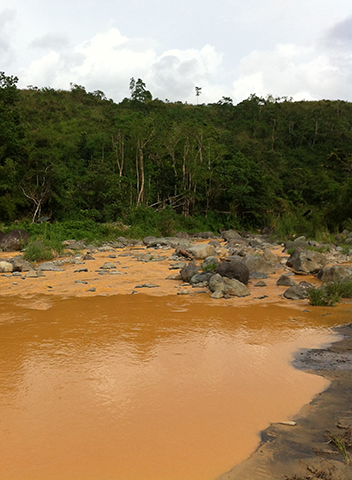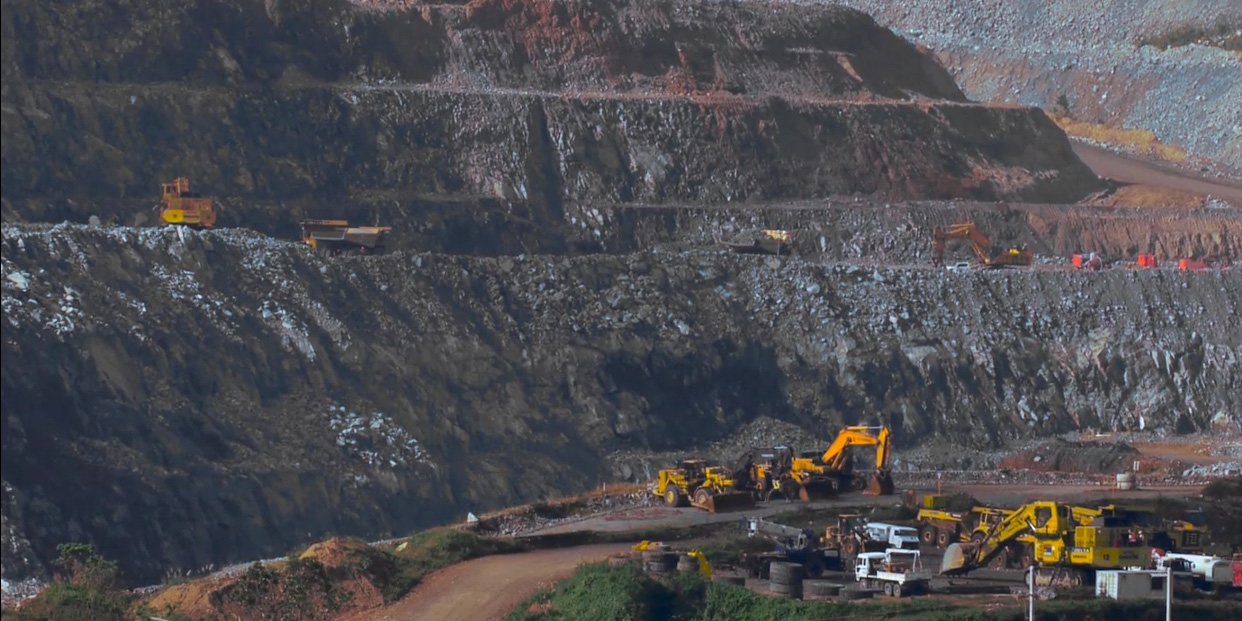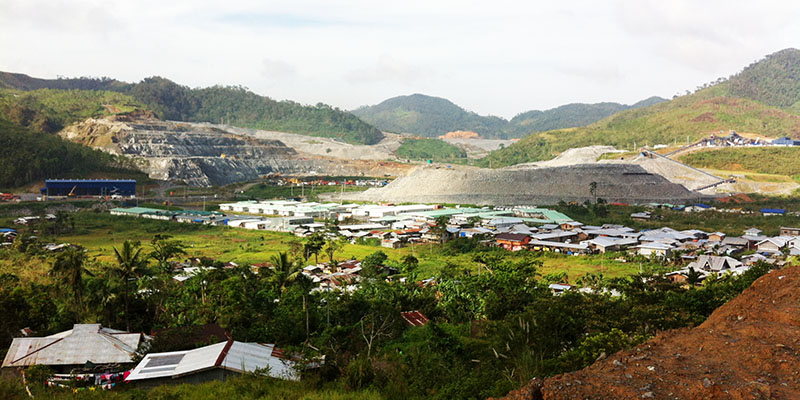Foreign mining companies scored for HR abuses, environmental damage in N. Vizcaya
Foreign mining companies Oceana Gold, Royalco Ltd., and FCF Minerals Inc. were scored for various human rights abuses and environmental destruction in four mining-affected communities ni Nueva Vizcaya. Nueva Vizcaya is at the “forefront of the (mining) industry’s most recent excesses,” according to a mission statement signed by 35 organizations that participated in a recent […]


Foreign mining companies Oceana Gold, Royalco Ltd., and FCF Minerals Inc. were scored for various human rights abuses and environmental destruction in four mining-affected communities ni Nueva Vizcaya.
Nueva Vizcaya is at the “forefront of the (mining) industry’s most recent excesses,” according to a mission statement signed by 35 organizations that participated in a recent National Fact-Finding and Solidarity Mission (NFSM) led by Alyansa ng Nagkakaisang Nueva Vizcayano para sa Kalikasan (ANNVIK), Kalipunan ng mga Katutubong Mamamayan ng Pilipinas, and Kalikasan-People’s Network for the Environment.
The NFSM teams unearthed cases of harassment and militarization of anti-mining barricaders where Royalco is undergoing exploration activities; as well as land grabbing, biodiversity loss, and water pollution where Oceana Gold and FCF Minerals have started full commercial operations.
“The results of our investigation…prove all too clearly that large scale mining is incompatible with basic principles of fairness and social justice. Any industry that has expressed so little respect for basic human dignity cannot possibly be in harmony with the hopes and aspirations of communities on the ground,” the mission said.
People’s barricades
In Yabbi, town of Dupax del Norte, people have successfully held a barricade against mining, hindering the Australian firm Royalco’s exploration activities. This, however, has been met by the deployment of the 3rd Infantry Battalion in the area, harassing residents.
According to locals, heavily-armed men stayed in the barricades from August 19 to 23. They were dressed in civilian clothes and tried to pose as rebels; however some villagers recognized them as CAFGU (Civilian Armed Forces Geographical Unit) members. “They also forcibly tried to enter homes, even while the people shut their doors on them,” said Kakay Tolentino, Katribu secretary general.
Sandy Vicente, 34, was held by the military from morning until 8 p.m., being forced to point out “where their comrades’ arms were being hidden,” in an effort to tag barricaders as rebels. Residents however insist that they are not rebels and that arms are forbidden inside the barricades, a rule which the military violated.
In fear, Anita Nab-Os Comsing, who was two months pregnant, had a miscarriage.
The residents also reported that their chickens, cooking implements, and rice were taken by the soldiers.
Meanwhile, Matson Dinoc, a resident of Pao in Kasibu town, said that guards of Royalco fire indiscriminately upon residents when drunk.
Locals of Pao and Paqued have also mounted a barricade against Royalco’s exploration activities since 2007. Like the barricaders in Yabbi, they prevent the company’s petrol containers from passing through the mountains. “The struggle continues because we have nowhere else to go. This is our land,” Dinoc told the NFSM team.
Royalco filed Temporary Restraining Orders (TRO) against ten leaders of the anti-mining barricades set up in both villages, but recently withdrew these cases. Disrupted by the barricades, the company also reportedly announced that it would pull out of Dupax del Norte and Kasibu.
However, residents fear that this is a ploy aimed at dismantling their barricades. Locals in Kasibu report that geologists of Royalco have been spotted in the area just this month.
Polluted rivers

Meanwhile, in Runruno, town of Quezon, the British company FCF Minerals demolished the homes of more than a hundred families, in preparation for operations of a gold and copper mine.
Last December 2012, work crews of the company along with local policemen broke through the barricades in Runruno, injuring six members of the community. They also filed cases of arson and attempted homicide against the barricaders. A married couple is still in jail in Tayab for these “trumped-up charges,” according to the NFSM team.
Small-scale miners have also been filed with charges of “illegal mining,” only this month. Other small-scale miners and farmers have been forced to give up their land.
Already, adverse effects from drilling and land preparation were observed by environmentalists and scientists who joined the mission.
“Waterways have either decreased in both flow and volume or have completely dried up… We also observed signs of decreased water quality, including signs of chemical contamination and increased turbidity…that will likely impact on the irrigation, potable water supply and sanitation of communities,” said Dr. Chito Medina, national coordinator of the peasant-scientist group MASIPAG.
He said that this was most apparent in Sulong River, where residents noted the disappearance of paco (ferns) and other riverside flora as well as a decrease and stunted growth of fishes.
In March 2013, the Department of Environment and Natural Resources gave FCF Minerals an Environmental Compliance Certificate and permission to operate in the area. The company plans to start mineral extraction by the last quarter of 2014.
In Didipio, Kasibu town, Australia-New Zealand firm Oceana Gold started full commercial operations five months ago. The NFSM team that visited the village noted massive environmental destruction brought about by drilling, rock blasting, logging, and disposal of toxic wastes. This has covered rice fields with silt and caused the disappearance of fishes and wildlife. (Read Destroying Didipio for an in-depth report)
“The situation of the indigenous peoples in Didipio offers a warning to other communities affected by corporate mining interests. The environmental destruction and the socio-economic impacts they suffer today is more reason to persist in the resistance against large mines,” Tolentino said.
Most residents of the mining-affected areas are Ifugaos who settled in Nueva Vizcaya after the construction of the Magat Dam flooded their communities in the 1960s.
According to Fr. Vicente Tiam, chair of Alyansa ng Nagkakaisang Novo Vizcayano para sa Kalikasan (ANNVIK), the findings of the mission is a “call for justice on the crimes committed by mining TNCs to the people and the environment of Nueva Vizcaya.”
Tiam said that the province should be free from large-scale mining, as it is a major watershed that serves seven major dams that supply water to North and Central Luzon. Mining also destroys the livelihood of people who are mostly dependent on farming vegetables and fruits that also supply Metro Manila, he said.
Meanwhile, Leon Dulce, spokesperson of the Defend Patrimony! Alliance, said that these projects, granted under the auspices of the Mining Act of 1995, are “more likely further reinforced by Pres. Benigno Aquino’s Executive Order 79 that may serve as basis for the overriding of local and national environmental policies.”
The mission is calling for the local and national governments to investigate the human rights abuses and environmental damage done by large-scale mining in Nueva Vizcaya.


